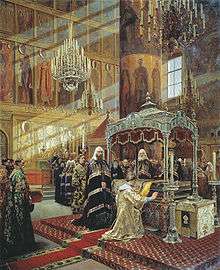Glorification
Glorification may have several meanings in the Christian religion. From the Catholic canonization to the similar sainthood of the Eastern Orthodox Church to salvation in Christianity in Protestant beliefs, the glorification of the human condition can be a long and arduous process.
Catholicism
In the Catholic Church, both Latin and Eastern Churches, the act of canonization is reserved to the Apostolic See and occurs at the conclusion of a long process requiring extensive proof that the candidate for canonization lived and died in such an exemplary and holy way that he is worthy to be recognized as a saint. The Church's official recognition of sanctity implies that the person is now in Heaven and that he may be publicly invoked and mentioned officially in the liturgy of the Church, including in the Litany of the Saints.
In the Catholic Church, canonization is a decree that allows universal veneration of the saint in the liturgy of the Roman Rite. For permission to venerate merely locally, only beatification is needed.[1]
Eastern Orthodox Church


The Orthodox Church in America uses the term "glorification" to refer to the official recognition of a person as a saint of the Church.[2][3]
The Russian Orthodox Church uses both канонизация "canonization"[4] and прославление[5] "glorification."[6]
Oriental Orthodox Church
The Oriental Orthodox Churches also hold a doctrinal tradition similar to the Eastern Orthodox Churches whereby martyrs are not in need of any formal glorification. With time, the greatness of their sanctity which is venerated by the faithful is recognized by the Church. In the words of Armenian Patriarch H. H. Karekin II, "The Armenian Church doesn't sanctify. It recognizes the sanctity of saints or of those people that is already common among people or has been shown with evidence".[7] This is in conformity with the tradition of other Churches in the Oriental Orthodox family such as Coptic Orthodox Church, Syriac Orthodox Church, Ethiopian Orthodox Church and Indian Orthodox Church. The instances of glorification of the 21 Coptic martyrs[8][9] in 2015 or the victims of Armenian genocide[10] of 1915 simply serve as official recognition given by the hierarchs to the steadfast faith of those who laid down their lives in defense of their Christian identity.
Protestantism
The Anglican churches practice canonization of saints, somewhat similar to the Catholic concept. There are two events that occur during glorification, these are "the receiving of perfection by the elect before entering into the kingdom of heaven," and "the receiving of the resurrection bodies by the elect".
Glorification is the third stage of Christian development. The first being justification, then sanctification, and finally glorification. (Rom. 8:28-30) Glorification is the completion, the consummation, the perfection, and the full realization of salvation.
Glorification as a term is modified by its target, i.e. who is being glorified: God or the Christian? The third stage of Christian development is to glorify God through one's life, to decrease so that He may increase so that as others encounter a living breathing Christian who is walking in Glorification, they encounter Christ and perceive His Glory and His presence. This is attainable while living, just as justification and sanctification are attainable while living.
Receiving of perfection
Glorification is the Protestant alternative to Purgatory, as it is "the means by which the elect receive perfection before entering into the kingdom of Heaven." According to the theologies of most major Protestant groups, Purgatory is a doctrine of the Catholic Church, a holding place for those whose lives were dominated by venial sins but not guilty of mortal sins. On the other hand, to Protestants, glorification is a continuous, flowing process, whereby believers in Jesus the Christ, who have either died or who are raptured alive (called up into heaven), receive glorified, perfect bodies and souls, sinless and Christlike. Those still living on earth have no effect on the outcome of those believers who have died or are raptured, nor do they have an effect on those who die without Christ.
While purgatory deals with the means by which the elect become perfect, Glorification deals with believers in Jesus being given perfection. The majority of Protestant denominations believe in this concept of glorification or something analogous to it, although some have alternative names for it.
Receiving of the resurrection bodies
After the final judgement, all the righteous dead shall arise and their bodies will be perfected and will become a glorified body. Only then can they enter heaven. To paraphrase C. S. Lewis's Weight of Glory: "If we were to see them in their glorified forms we would be tempted to bow down and worship them."
References
- ↑ "Beatification, in the present discipline, differs from canonization in this: that the former implies (1) a locally restricted, not a universal, permission to venerate, which is (2) a mere permission, and no precept; while canonization implies a universal precept" (Beccari, Camillo. "Beatification and Canonization". The Catholic Encyclopedia. Vol. 2. New York, New York: Robert Appleton Company, 1907. Accessed 27 May 2009.).
- ↑ ""What does "Glorification" Mean?" by Fr. Alexy Young".
- ↑ "The Glorification of Saints in the Orthodox Church" by Fr. Joseph Frawley
- ↑ "Почему был канонизирован Николай Второй?".
- ↑ "Прославление святых – это не дело узкого круга специалистов, это дело всей Церкви".
- ↑ "The Glorification of Saints". www.fatheralexander.org.
- ↑ "Armenian Apostolic Church to canonize Armenian Genocide victims on April 23 after long interval".
- ↑ "Christians Mourn Their Relatives Beheaded by ISIS". Time.
- ↑ "Coptic Church recognises martyrdom of 21 Christians killed by ISIS - CatholicHerald.co.uk". 23 February 2015.
- ↑ "Armenian Church irritates Turkey with plans to canonize genocide victims".
External links
- Protestantism
- http://www.abideinchrist.com/keys/sanctification-perfect.html
- http://www.sdanet.org/atissue/books/wws/salv17.htm